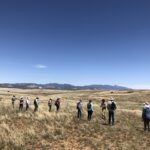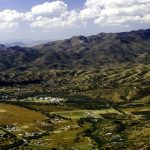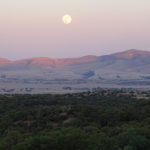Guest Post by Elizabeth Bernays, Regents’ Professor Emeritus, University of Arizona
The Coronado Forest Supervisor, Jim Upchurch, addressed the community of Patagonia last Thursday, September 6th. The meeting was ostensibly to introduce the new Sierra Vista District Ranger, Mark Ruggiero, and discuss other issues about the Patagonia water supply. The meeting was mainly a diatribe from Mr. Upchurch about his legal responsibilities to honor the 1872 mining law. He started with some of the definitions, such as locating and leasing resources, and scoping for minerals, and he took many quite polite questions from the floor, most of which were reasonable issues from a concerned public. He made it plain that his job was to usher the mining corporations through the maze of Federal, State and local regulations, and minimize any problems they may face from a public that is principally a nuisance to them.
Our concerns are serious. There was little indication that the Forest Service actually cared about the concerns quoted in the job description of Forest Chief, Tom Tidwell:
“Healthy lands support the outdoor activities of millions of Americans each year, a service we proudly provide on the National Forest System. A central concern for all Americans is sustainable land management. We owe it to ourselves and to future generations to protect our communities, properties, and wildland resources from catastrophic fire and other threats.”
We all know that the 1872 mining law was made for a completely different period and a vastly different level of technology, and that the pick and shovel mines were as nothing compared with the vast open pit mines that we see today for extracting the very small proportion of the mass of rock that contains minerals. The despoiling of so much requires a superior level of understanding and balance regarding what happens on our wild lands, and it was profoundly distressing to discover that obtaining mineral resources is considered so important that the big picture is totally ignored. The needs for the communities and the future are apparently rated as impediments to the progress of major corporations, including various foreign entities with reduced levels of caretaking, limited addition to the financial well-being of our country, and no sign of concern for the ecology of place. He even stated that if the cost of repairing a destroyed region were too great, then it could not be enforced!
Mr. Upchurch stressed the laws: the out-of-date mining law and the three laws that must be overcome first concerning clean air, clean water and endangered species. He did not address the need to see the whole picture, or the role of overall balanced judgments:
- What is the balance between the economic value of the corporate mining activity vs. the local economy, and to what extent should one destroy the other?
- Where is the concern for having open pit mines so close to a major city (Tucson in this case) and almost on top of small towns nearby, and how can the use of so much water be acceptable as it threatens the more than a million people?
- Where is the judgment of the Forest Service to encourage mining in a place where water is more precious than gold, where a long-term drought is predicted to become very long term?
- Where is the real ecological concern, as opposed to the skimpy and biased opinions concerning the threats not just to endangered or sensitive species, but to a whole ecosystem where reduced water tables could in 50 years mean that even the tree cover of thousands of acres would very likely disappear.
- How do we know that the cumulative effects of the proposed activities of several mining companies are being considered?
- Where is the sensible broad thinking concerning places that are more sensitive to destroy vs. places that are already degraded, or places with limited biodiversity? Santa Cruz and Cochise counties are way off the chart in numbers of sensitive species as has been shown recently by ecologists, but we hear nothing about such issues from the Forest Service.
The lack of balance is extremely disturbing. The lack of insight into what could be the future of Tucson, surrounding townships, agriculture, and the wild lands of the Sky Islands is profoundly worrying. The leadership at all levels of government seems to be in question – of the Forest Service Chief (Tom Tidwell), the Undersecretary for Natural Resources and the Environment (Harris Sherman), and the Secretary for the USDA itself (Tom Vilsack). We need more than a wooden and belligerent acceptance of a law that was made for a pioneering era. One even has to wonder if there are unseen, or even unseemly, rewards.










